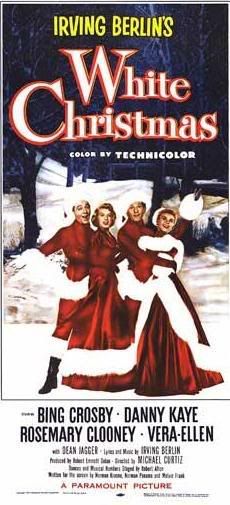
"Irving Berlin's White Christmas" (1954)
we watched irving berlin's classic 1954 film, White Christmas, today on the big screen. it was a delightful experience: the theatre was packed; there were many families there with their kids; and many of those kids, even in their early teens, had never seen the movie before. they laughed at the melodramatic acting, the dance sequences, and often applauded at the end of musical numbers. the whole audience applauded at the end of the movie. and that includes me; i love White Christmas. it is sappy and, to borrow a word from the movie, schmaltzy, but it really doesn't matter; i have to watch it at least once during the season or the year just is not complete.
but something struck me this time that i had not really given a great deal of thought before. the film is a nostalgia-piece. but what is berlin nostalgic for? there remains, today, a large segment of the american population which looks longingly to the 1950's itself as an idyllic age, before the sexual revolution really took hold, before the country lost it's innocence in viet nam, before stonewall, before no-fault divorce destroyed the american family, before the kennedys were murdered, before watergate, and one can go on and on. the 1950's are the "good ole' days". but berlin's film is itself set in the 1950's and he is very clearly already nostalgic for something lost.
this shows up at several points throughout the film. the song and dance number entitled "choreography" mocks the changes that had taken place and the innovations of modern dance. several other numbers recall vaudeville style shows and another large number explicitly harkens back to the "minstrel shows" of the previous generation. but the nostalgia is not simply expressed with respect to the arts; of course artistic and social changes go hand-in-hand. the movie dwells on the theme of the ambition of younger women and how it serves as a destablizing social influence as they pursue careers, refusing to settle down and get married as they used to do. the wacs are praised extensively in another musical number for their dedicated entertainment of the men-folk in a time of war, and care is taken to remind everyone what a great job it was because it was so easy to find a husband.
berlin is nostalgic, then, for the values of the era that predated world war 2. he longs for a return to the glory days of what some have referred to as "the greatest generation". before the war changed everything: snatched youth away from so many young men, snatched women out of their appointed roles and into the work force, turned the world into a place where "everyone has an angle" (the self-interested nature of modern life is also a running theme). and this raises an interesting point. the norman-rockwell-1950's-idealized-americana that remains the dream of many (euphemized under the term "family values") is already a false hope according to berlin. the 1940's had introduced technological and economic innovations that would change the social structure of liberal society irrevocably. the nostalgia for the 1950's is nostalgia for an era that is already itself nostalgic (White Christmas was the top money maker for 1954). one cannot rush back to eden when the supposed-eden has itself, at least according to berlin, already fallen.
the fact is that nostalgia can never reach back far enough to fulfill its desire: to abdicate one's freedom, one's responsibility towards the Future. it is not just an emotion or a whistful feeling, nostalgia represents a fundamental intentionality that one possesses towards the world - one which frees us from responsibility and decision. one no longer needs to make a decision, one no longer needs one's freedom, the decisions were made for us in a previous time. we need simply repeat them anew.
of course nostalgia is undermined by its own desire because it is itself a decision: a free attempt to annul one's freedom, a hope against-hope; it denies faith in History by projecting an anti-Future as the Truth-which-is-our-Future. the dream of a white christmas is the dream about the past; nostalgia longs for that which is dead, instead of turning in hope towards new life.
-LoA
2 comments:
Nostalgia also looks at a past through rose colored glasses, forgetting all but good things. The fifties had the Korean war, segregation, and a host of ills that are overlooked. So does every time period. Nostalgia is more a white dream than anything else.
Ya Haqq!
yes, maybe in a future version of this essay (next xmas?? lol) i want to bring out the fact that they are waiting around for the snow to cover over and hide everything so that reality (in this case, vermont!) is turned into a playground ("vermont: america's winter play ground"). as you say, they want to white it all out. but there is no tabula rasa, and History will not be held back.
Post a Comment